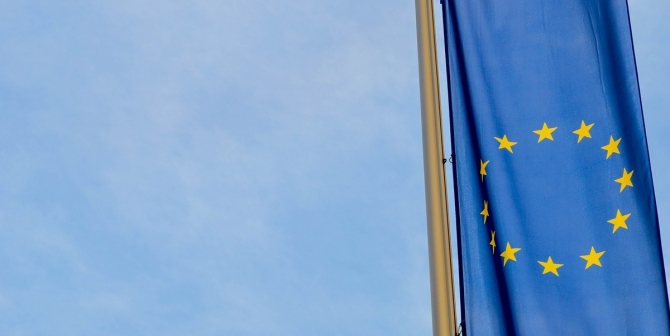UK Culture Minister John Whittingdale just launched a public consultation on the Government’s Green Paper on the BBC Charter Renewal. LSE’s Damian Tambini gives his initial response, voicing concern about the implications of the government’s vision for the BBC’s independence.
More than 15 years ago, a former colleague at the LSE Professor Richard Collins called it the ‘Goldilocks Question’. How much BBC is not too big, not too little, but Just Right?
The reason the BBC has responded so robustly to today’s Green Paper on the future of the BBC is that this consultation clearly implies that the BBC is not only too big but is broadcasting programmes that the government does not approve of. Not only does this document put up for debate the funding mechanism for the BBC, it sets out the arguments for diminishing the size, scope and remit, and insodoing Whitehall is crossing a rubicon: in effect dictating some aspects of editorial policy at the ‘independent’ BBC.
Changed environment for Charter renewal
Collins was writing at the beginning of the Digital Transition, when the BBC was criticised for chilling public service by private media organisations. As the new Green Paper on the BBC points out, the question is even more pressing now as the BBC faces rapidly declining audiences for some (broadcast) services, and dominance in other (radio and online) markets, particularly news, where it is now in direct competition with newspapers.
This was always going to be the mother of all Charter Review battles because more so than ever newspapers have skin in the game, and they are leading the charge against public service broadcasting (PSB), all over Europe.
For the BBC, the problem is that none of the established technocratic approaches to the Goldilocks Question –the analysis of market failures, the standard Treasury Green Book approach to justifications of market intervention, even the BBC’s own Public Value Assessments – yield clear answers to the question of size and scope posed by the Green Paper.
For some – and there are strong echoes of this reasoning in the Green Paper- public ownership and regulation of audiovisual services is a feature of the old Broadcasting Century, which can be phased out when conditions of public goods, market failure and spectrum scarcity are no longer an issue. For others, including myself, given the increasing importance of media in democratic, cultural and economic life, there is an overriding public interest in all citizens having a choice between media institutions that respond to market pressures, and public service oriented institutions.
The public and its interest?
If regulatory theory or economics offer no clear way of answering the fundamental Goldilocks question, it will ultimately be a matter of political will and judgement. So when the question of the BBC’s size and scope is wrapped into a consultation immediately following an election during which the winning party has been publicly critical of the BBC’s election coverage, commentators and citizens are rightly worried that the Public Interest will come last.
The Government is right to open up a radical debate about the BBC at this point. In particular the question of what structures – particularly in a future without the licence fee – can build relationships between the BBC and its users.
But the worry for the BBC is that this debate will be captured by the self-interest on the one hand of newspapers who claim their market share is determined by BBC activities and on the other hand by politicians whose interest a scared, diminished BBC obviously serves.
As with the setting of the licence fee last week, the Government seems to have forgotten some of the basic precepts of broadcasting policy – the etiquette of broadcaster independence.
![Twilight for the BBC? Photo by Tim Loudon [CC BY-ND 2.0]](https://blogs.lse.ac.uk/mediapolicyproject/files/2015/07/BBC-at-night-300x159.jpg)
This is not rocket science. In fact it is the normal way of conducting a review of the size and scope of the BBC, developed at 10 yearly intervals over nearly a century since the Sykes Committee and the Crawford Committee reports led to the establishment of the BBC by Royal Charter in 1926. There should be a non-political, civil society engaged expert panel established to publish recommendations that are above and beyond the political and market self-interests. These recommendations should not bind government, but government should give reasons for departure from them.
These committees were considered by some to be outmoded and remote in their pale, male and stale paternalism since Peacock reported in 1986. A new committee would not have to be like this: it could engage with the most up to date deliberative research and public engagement, and could build on existing online tools of engagement.
The ‘committee of experts’ established by DCMS last week is not such a committee. They are all brilliant people, and will have excellent suggestions, but they are a sounding board for the proposals of the government, (critics will say a fig leaf for them), and have not been asked to write a report. They will not have sufficient independence from Government unless they can write and publish their own report.
The recent Ofcom PSB review described the BBC as the cornerstone of the UK broadcasting system. That sounds nice but it is inaccurate. The BBC is the foundation of the system, holding up standards and providing training, support and a quality threshold that supports all other media in the system. There is a scale below which such an impact would effectively cease, and the danger of this Green Paper is that it is a blueprint for undermining the foundation of one of the worlds best media systems.
This post gives the views of the author, and does not represent the position of the LSE Media Policy Project blog, nor of the London School of Economics and Political Science.







2 Comments